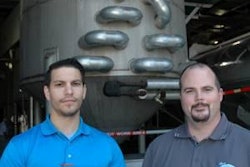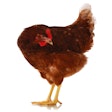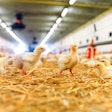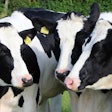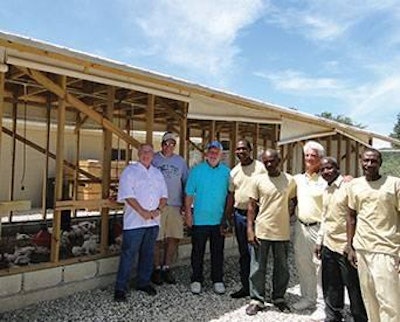
Guest, vice president marketing and sales, Harrison Poultry; David Bleth, vice president operations, Harrison Poultry; Mike Welch, president and CEO, Harrison Poultry; Willy, president, Poul Mirak Co-op; Ronald, secretary, Poul Mirak Co-op; Rad Hazelip, Love A Child; David, Poul Mirak Co-op member; John Robert, Poul Mirak Co-op member; and not pictured, Freddy, Poul Mirak Co-op member.
The U.S. poultry industry workers who helped start a chicken production cooperative in Haiti could be called missionaries because they traveled to the poorest nation in the world to help people grow broilers to feed themselves and earn an income.
The poultry cooperative, named “Poul Mirak” in Haitian Creole, or Miracle Chicken, is run by Love A Child, a Christian humanitarian organization, but the project which started up in 2014 received support and funding from the World Poultry Foundation (formerly USA Poultry & Egg Export Council International Poultry Development Program) and private individuals in the U.S. poultry industry.
One of them, Mike Welch, president and CEO of the U.S. broiler production company Harrison Poultry and board member of World Poultry Foundation, led a U.S. poultry industry effort in 2011 that donated $1 million worth of cooked, canned chicken to some of Haiti’s poorest citizens.
Welch, along with the missionaries in Haiti, was interested in finding a way to provide more sustainable help to the people. “After the million cans of chicken had been distributed in 2011,” he explained, “the question was 'what’s next?' People get hungry again.”
Chicken co-op is sustainable humanitarianism
How to break the cycle of hunger, charity and dependency is an age-old problem, and one well understood by full-time, in-country missionaries Bobby and Sherry Burnette.
Bobby Burnette said, “A man recently said to me, ‘When I’m hungry I can’t think of anything.’ And it’s true, when a poor Haitian father or mother is hungry and their children are hungry, they can’t think what to do. There’s no money, no jobs. They’re just trying to survive."
The unmet dietary needs in Haiti, indeed, are enormous. Love A Child distributes around 20 million meals a year to the poor in a nation, where two-thirds of the people have an issue with access to food on a daily basis. That’s why he is so excited about the nearly year-old Grand Miracle Market, which includes a chicken growing cooperative that provides protein and income to the poor in Haiti.
Grand Miracle Market supports 450 vendors
Gwo Maché Mirak (Grand Miracle Market) is an open-air market built in 2014 and located in the southeastern Haitian village known as Fond Parisien. Located 30 miles east of Port-au-Prince, along the main road between Port-au-Prince and Santo Domingo, Dominican Republic, the market features 10 pavilion-style buildings, a playground for children, restaurants, bank, pharmacy and more. Nearly 450 vendors are represented at the market, which covers 20 acres.
Tucked away on the back side of the market complex, toward a lake and mountain to promote biosecurity, is the Poul Mirak Chicken Co-op, which produces chicken for the rural population, providing much needed protein, while spurring local commerce.
Chicken Co-op provides Haitians protein, income
Poul Mirak Co-op members grow chickens in nine 10- by 40-foot houses, each with a capacity of 500 broilers. The chickens are grown for six weeks to around 4.4 pounds (2 kilos) and then sold a few birds at a time to the local people.
Five Haitian co-op members receive training and ongoing mentoring for running an effective chicken business. After a set term of running the co-op, the five will have the opportunity to seek financing to establish their own private businesses and new co-op members will be selected.
“We’re trying to teach people sustainable ways to support themselves, to make their own money, to grow and support their own families,” said Love A Child founder, Bobby Burnette. “It helps get them from a point of hunger with no pride and dignity to the point where they can raise and sell a chicken and develop business skills so they can support themselves.”
Chicken economics 101 in rural Haiti
“Everybody from the poorest of the poor to the wealthiest in Haiti loves chicken,” Bobby Burnette said. “If a poor man can get his little pennies together, he'll buy a chicken, a piece of a chicken, or a leg or a thigh."
He described a typical scene at the gates of the chicken co-op: “Two peasant Haitians, very poor Haitians, were there waiting outside the gates of the chicken growing facility. One was a man, who was buying five chickens. And the other was a woman, who was buying ten chickens.
“I asked the man, ‘Why are you buying five chickens?’ because in our area, nobody freezes chicken and nobody has a refrigerator. He said, ‘I am going to eat one of the chickens now, but I'm going to sell the other four chickens to make me a little money.’”
Miracle Chicken Co-op is sustainable
Chicken growing was first piloted by Bobby Burnette on a very small scale at the Love A Child orphanage. Welch and other U.S. poultry industry people were instrumental in the planning of the commercial-scale chicken growing operation that exists today.
“It may sound like small potatoes, but the chicken co-op has a real economic effect,” Welch said. “It creates income for the co-op members and for the buyers and sellers of the chickens. Plus jobs are created in the hatchery supplying the co-op with chicks and in the feed mill."
Chicks and feed for the Miracle Chicken Co-op are purchased from Haiti Broilers, a division of Jamaica Broilers.
The Miracle Chicken Co-op model is sponsored by the World Poultry Foundation, Mike Welch, Larry Guest and other friends.
Love A Child Inc., is a 501(c)(3) nonprofit Christian humanitarian organization, serving the needs of children in Haiti. Founders Bobby and Sherry Burnette live year-round in Haiti at the Love A Child Orphanage.



